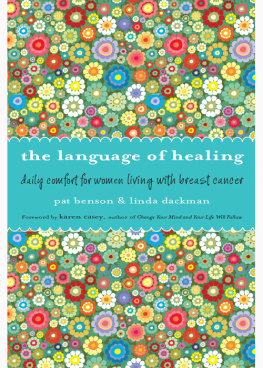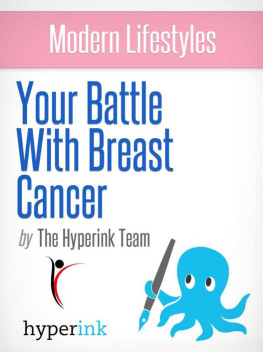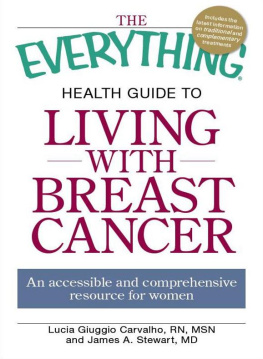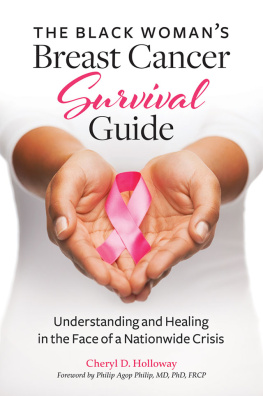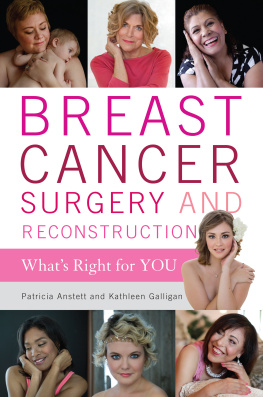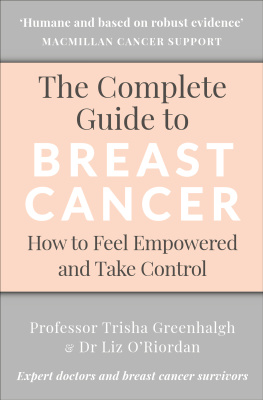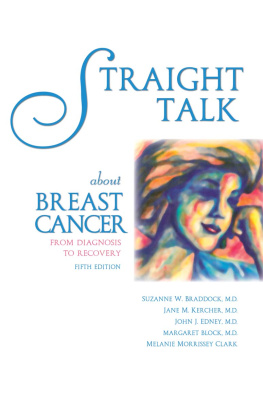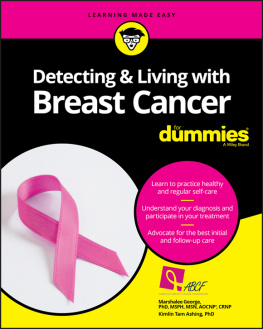
First published in 2014 by Conari Press, an imprint of
Red Wheel/Weiser, LLC
With offices at:
665 Third Street, Suite 400
San Francisco, CA 94107
www.redwheelweiser.com
Copyright 2014 by Pat Benson and Linda Dackman
All rights reserved. No part of this publication may be reproduced or transmitted in any form or by any means, electronic or mechanical, including photocopying, recording, or by any information storage and retrieval system, without permission in writing from Red Wheel/Weiser, LLC. Reviewers may quote brief passages.
ISBN: 978-1-57324-631-6
Library of Congress Cataloging-in-Publication Data
Benson, Pat.
The language of healing : daily comfort for women living with breast cancer / Pat Benson and Linda Dackman.
pages cm
ISBN 978-1-57324-631-6
1. Breast--Cancer. 2. Breast--Cancer--Patients. I. Dackman, Linda. II. Title.
RC280.B8B44 2014
616.99'449--dc23
2013048181
Cover design by Jim Warner
Cover photograph shutterstock / daniana
Interior by Jane Hagaman
Typeset in Constantia
Printed on acid-free paper in the United States of America.
EBM
10 9 8 7 6 5 4 3 2 1
The paper used in this publication meets the minimum requirements of the American National Standard for Information SciencesPermanence of Paper for Printed Library Materials Z39.48-1992 (R1997).
www.redwheelweiser.com
www.redwheelweiser.com/newsletter
In memory of Ruth Hellriegel
for her grace and optimism.

To Toni Poletes
for teaching so many how to live each day.
Pat
For my sister Gale and my friend Jo.
Linda
And to all the women who told us their stories.
Pat and Linda
Some people see scars, and it is the wounding they remember. To me, they are proof that there is healing.
Linda K. Hogan
Contents
Reactions Coping Decisions
Surgery Chemotherapy & Radiation Reconstruction Body & Self Relationships Sexuality Survival
Endings In Between New Beginnings
Foreword
Breast cancer, the doctor said to my frightened mother as I looked on. She wasn't surprised, really. She had felt the lump every day, again and again. Repeatedly, she had run her fingers over it. For many weeks she felt it, she saw it, but she tried to ignore the obvious. And she ignored the voice within too, the voice that said, Call the doctor. She had not wanted to face the possibility of cancer. She had not wanted her life to change, to know what was on the other side of the lump. Like most women, she simply wanted to wake up one morning and discover the lump gone.
My mother wasn't the only one in the family with breast cancer. My maternal grandmother and three maternal aunts were also diagnosed; five women who faced breast cancer, each in her own way, making different choices, but all bravely meeting the challenges. Every year when I go for my mammogram, I wait, tentatively, for the letter I hope to receive, the one that says, Your results are normal. I have been lucky, so far. But while we know much more about the genetic links to breast cancer, we also know that the majority of women who get this disease have no family history. A staggering one in eight women will experience breast cancer in her lifetime. And while the medical community has developed more targeted and effective therapies, there is still no cure.
Breast cancer is profoundly painful, most times physically, oftentimes emotionally, and sometimes spiritually. Women come face-to-face with their own mortality, knowing there are no certain outcomes. They turn to other women who are fighting this disease for the support, advice, and inspiration they need. And that is exactly what The Language of Healing: Daily Comfort for Women Living with Breast Cancer offerscomfort, guidance, and practical information, from women who have been there.
Pat Benson and Linda Dackman, the authors of this special book of tough and tender reflections, know firsthand the shock of a diagnosis, the grueling challenges of treatment, and the healing power of turning to other women with breast cancer for insight and inspiration. They wanted to offer a support group in a book, so that help could always be at hand, wherever you are on your journey. The Language of Healing includes their voices, as well as the voices of a diverse group of other women of all ages and attitudes. The book is divided into three partsA Time to Cry, A Time to Heal, and A Time to Livethe portals every woman with breast cancer walks through as she comes to terms with her disease.
I deeply believe that peer support and books are vital tools for healing, so when I was asked to write the foreword to The Language of Healing, I was honored. I am the author of a number of books for women who are struggling with a range of life issues. But all my work is grounded in the belief that the path of recovery begins with learning to take life one day at a time, even one moment at a time. This is how we give ourselves the opportunity to listen not only to the experts, but to consider what our inner voices have to say. This trusting in ourselves, coupled with the open and nonjudgmental sharing with other companions on this journey, companions who promise steady, quiet strength, and who can reach us when another's words may ring hollow, who can ease our ways and even change our lives.
The Language of Healing is a companion for you, too, as you walk your individual path on the common ground of breast cancer to arrive at peace. And isn't that what we all want? Regardless of our circumstances, we want the peace to go on moment by moment, and despite whatever has derailed us, the ability to live life fully each day. That resilient spirit of moving through fear, loss, and grief to arrive at such a peace is present on every page of this lovely book.
Karen Casey, author of bestselling books
Each Day a New Beginning and
Change Your Mind and Your Life Will Follow
Thank you to family, friends, and colleagues who supported this project, especially Linda Dackman, Karen Casey, Karen Chernyaev, Jan Johnson, Caroline Pincus, Ken Merz, Jessica Merz Godes, Bryn Benson, and Julie Edstrom. A most special thanks to my grandson, Andrew, for keeping me in the moment, and to the late, great Nick, the best dog ever, for keeping me wild.
Pat Benson
For this book, I wish to acknowledge Pat Benson... and Pat Benson only. Thank you, Pat.
Linda Dackman
Introduction
Like so many other women, we, the authors, have lived through the shock of breast cancer diagnoses. One of us was thirty-four years old, a single woman living on the West Coast who had her whole life ahead of her; the other, a post-menopausal, married, fifty-six-year-old Midwesterner, eagerly anticipating the birth of a grandchild. We didn't know each other as we made our separate ways from diagnosis through treatment and recovery. We met when we were asked to explore the possibility of working on a book about confronting breast cancer. We agreed, and as we shared our individual stories, we discovered that while our lives are very different, our breast cancer stories have much in common.
We experienced the same sense of loss and disorientation. We shared similar questions as we wandered through the wilderness of medical opinions, options, choices, and terror. In recovery, we both struggled in the aftermath of the physical, emotional, and psychological effects to our lives. We had to redefine what normal meant to us. We began to live life with a renewed sense of the value of each and every day. Most importantly, we found immeasurable support and guidance in listening to the stories of other women facing breast cancer and in sharing ours. By reflecting on the advice and insights offered, we responded to our individual challenges in confident, thoughtful, and healing ways. Acceptance overcame anger, understanding overtook confusion, and courage diminished fear. Moment by moment, breast cancer became an unexpected journey of self-discovery, new friends, and new beginnings.
Next page
